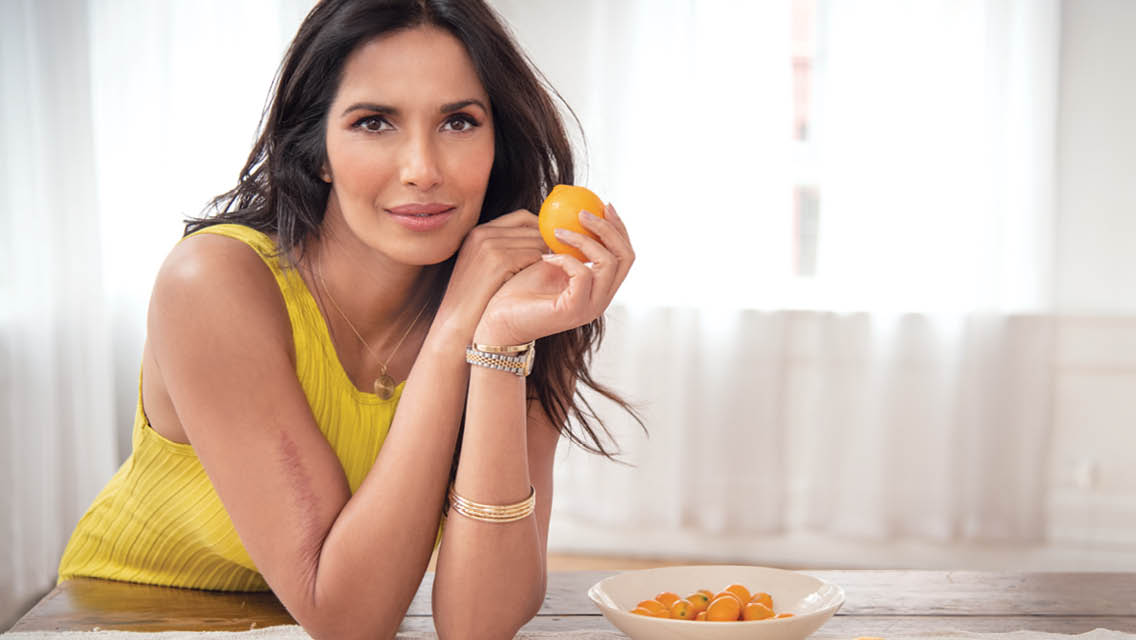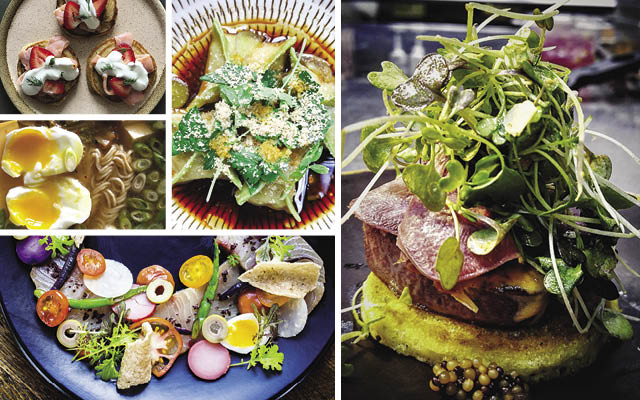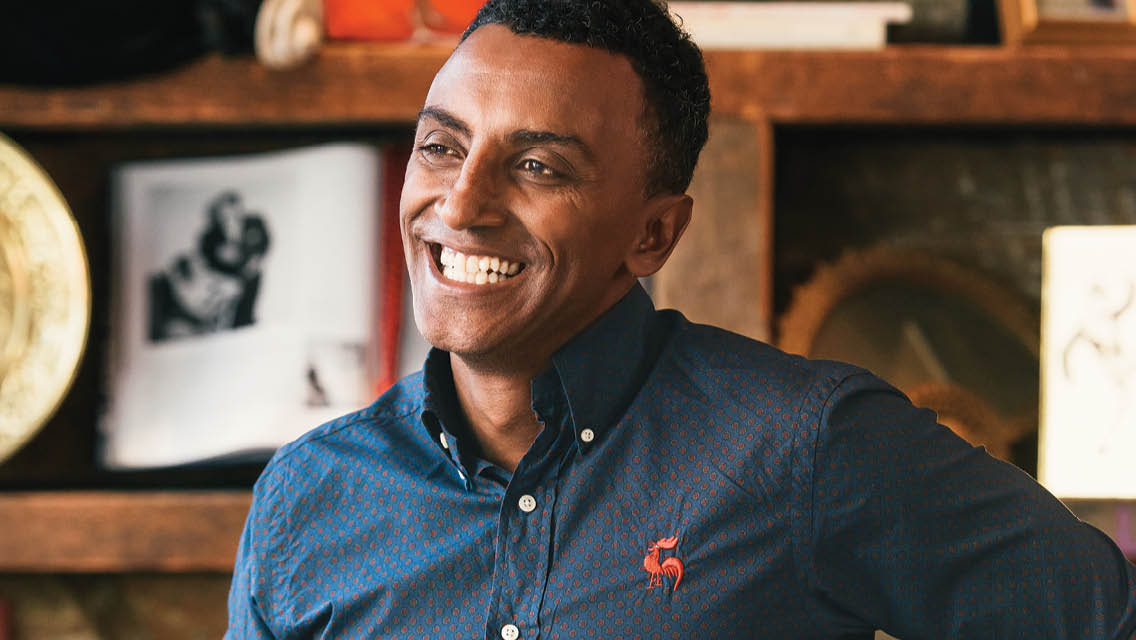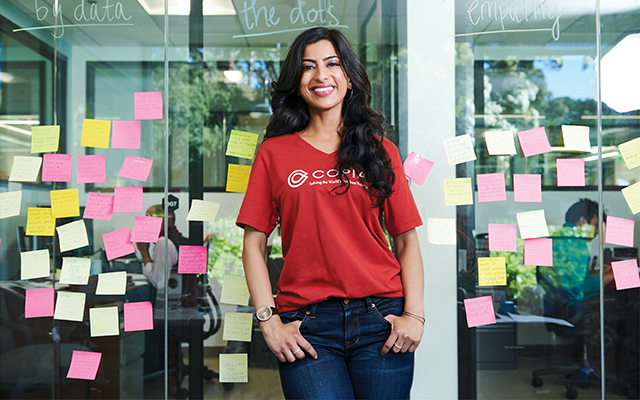In her show Taste the Nation, Padma Lakshmi adds a new title to her already impressive CV: culinary crusader. The Emmy-nominated veteran of Top Chef has turned her passion and advocacy for immigrant culture (she was an artist ambassador with the American Civil Liberties Union for five years) into a program that melds the authentic food she loves with its originating cultures. It’s a treat for body and soul.
“The issue of immigration in this country is such an integral one — so many cultures have come here and contributed to American culture,” says the best-selling cookbook and children’s-book author and former model. “America to me is a microcosm of the world. In reality, it’s a lot of conflicting, complex things, but our nation as an ideal is a much bigger and more important beacon of hope internationally. I wanted to show that. I wanted people from whatever community I was featuring to speak for themselves.”
Growing up in New York City and Chennai, India, Lakshmi, 51, says her appreciation of food began in her family’s kitchen, where she learned to cook vegetarian Indian food with her mother, grandmother, and aunts.
“My grandmother, along with the other women in my family, gave me the foundation for cooking,” she recalls. “I didn’t grow up eating in fancy restaurants. My mother cooked at home nearly every day, except when we went out for pizza or Chinese food once or twice a month.”
As an adult, Lakshmi has dined in plenty of upscale restaurants around the world, but she says she still prefers mom-and-pop eateries, back-alley food carts, or a bowl of homemade chicken soup. “I’m interested in food and its connection to peoples’ lives,” she explains. “I’m not pooh-poohing fine dining — it’s the world I’ve been knee-deep in. But at the end of the day, on my own free time, I prefer a hole-in-the-wall restaurant.”
It’s that perspective that has made her a favorite among viewers — even though she’s always felt like a bit of an outsider in the food world. In fact, she’s never worked in a restaurant.
“I’ve always been a little left of center, and I’ve always had kind of off-kilter tastes,” she admits. “But the minute I decided to be as much myself as I could and not apologize for it or bend to try to shape or shift myself into what I thought other people might want me to be was the moment I started finally really experiencing success.”
In a recent Zoom interview, Lakshmi shared how she found her way into food writing, her take on food culture, and how her innate curiosity nourishes her as she navigates a jam-packed schedule.
Q&A With Padma Lakshmi
Experience Life | How did you find your way into the world of food writing?
Padma Lakshmi | I’ve always loved to cook and to write — I just never knew you could have a career in it. I learned this from my grandparents: My grandfather loved books and instilled a love of books in me, and my grandmother was an excellent cook — she taught me all the principles of food that I know.
These two people who raised me, along with my mother, gave me this path in life. It’s only recently that I’ve seen it for what it is and that I’ve fully realized it.
EL | That path has included a 16-year tenure with Top Chef and now Taste the Nation, among many other accomplishments. How do you maintain your enthusiasm for the former while also delving more deeply into food culture in your new show?
PL | I think they are two opposites of the same world. Top Chef is like my family. When I go back every year to shoot a new season, it’s like a big family reunion. I’ve grown up with the people on that show, and we’ve experienced everything from childbirth to death and divorce together. Without Top Chef, I would not have the platform that I do to do a documentary-style show like Taste the Nation or for the cookbooks or my children’s book.
Taste the Nation is my little documentary food show — it’s very auteur-driven and represents my worldview. At the end of the day, the show is my voice, and the only thing that matters is that I’m being honest, that I’m willing to learn, and that I’m being respectful and authentic to the communities I embed myself in. It’s about allowing them space and listening to their stories as told by them, as they see fit.
EL | Indian food is part of your personal immigrant story. Does Indian cooking get the love it deserves?
PL| I think Indian food is on the cusp of being as well known as some of the other immigrant cuisines in this country, like Mexican, Chinese, or Thai food. I don’t think it’s there yet because, until now, it’s been North Indian food that has dominated outside of India: tandoori chicken, naan, heavy, meat-based curries.
But Indian food is very regional: The South is more rice-based; the North is more wheat-based. The South features a lot of fish, coconut milk, chilies. It all makes for a very rich terrain for eating different kinds of foods.
EL | Do you have a go-to Indian dish that might be new to a lot of readers and worth trying?
PL | I make a very simple fish curry called meen moilee. It’s sautéed ginger, onion, and garlic with some turmeric, curry leaves, and green chili. You sauté the vegetables together, then brown the spices in the pan. Then you deglaze the pan with coconut milk and let that simmer. When the coconut milk begins to separate, you add a little bit of mango powder or tamarind, and then you poach the fish in that mixture.
You can add any kind of vegetable you want or make the same dish with chicken, vegetables, or just tofu. There is a misconception that all Indian dishes are spicy, but this is a very delicate dish.
EL | Do you and your 12-year-old daughter, Krishna, cook and eat together?
PL | My daughter likes to cook but prefers to bake. She’s grown up on the set of Top Chef, she’s been at all the shoots for my cookbooks, and she goes to food festivals with me. She’s knee-deep in it too, so I don’t have to try very hard to get her in the kitchen.
EL | How have you guided her eating habits?
PL | She has great eating habits. She loves vegetables, but she also loves sugar, cakes, boba tea, and all that stuff. She’s very conscious of what she is and is not eating, so I don’t worry about it.
I don’t believe in forcing children to eat, but I also don’t believe in placating children. The attitude I’ve always had in our house is that “this is what is for dinner, and this is what we’re eating. If you don’t like it, there are leftovers in the fridge or you can have a scrambled egg with some carrots, celery, and cucumber and wrap it in a tortilla.”
EL | How do you nourish yourself when you’re traveling and working and raising a daughter?
PL | I would like to rest, but my version of rest and relaxation is going somewhere: choosing a country and going there to explore it through its food, historical sites, art, and music. I am a nomad at heart. I have very little expertise in anything, but my superpower is that I’m a curious person. I like to learn about other people’s cultures, to listen to their music, see how they dress and speak, and hear what their jokes are about. I want to have those experiences when there’s not a camera running.
EL | What does wellness mean for you?
PL | It means having enough time to relax and do nothing — which I’m admittedly not good at. It’s having enough time to exercise regularly and do a slow and methodical workout. I’m a beast when it comes to working out. I love it! I consider it a privilege that I get to work out as much as I do because most people in this country don’t have the resources or time to do it with their work schedules.
My most precious commodity is my time. It’s very alluring to want to take on more and more work and responsibility, but at the end of the day, my first priority is making sure that I’m a present and attentive mother, and my second priority is making sure I’m intellectually gratified.
EL | What would you like your legacy to be?
PL | I hope I am able to teach a generation or more of people around the world about food and its connection to identity — whatever that food is and whoever’s identity we’re talking about.





This Post Has 0 Comments